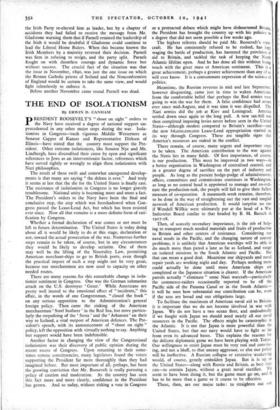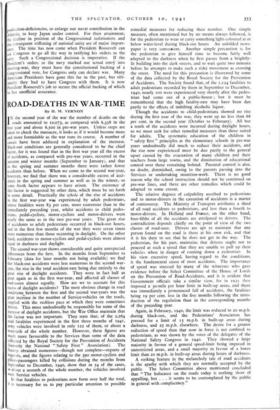THE END OF ISOLATIONISM
By ERWIN D. CANHAM
pRESIDENT ROOSEVELT'S "shoot on sight" orders to the Navy have received a degree of national support un- precedented in any other major steps during the war. Isola- tionists in Congresssuch vigorous Middle Westerners as Senator Capper of Kansas and Representative Dirksen of Illinois—have stated that the country must support the Pre- sident. Other extreme isolationists, like Senator Nye and Mr. Lindbergh, have discredited their cause by open and significant references to Jews as an interventionist factor, references which have served rightly or wrongly to align these isolationists with Nazi philosophies.
The result of these swift and somewhat unexpected develop- ments is that many are saying "the debate is over." And truly it seems at last that the die for the United States is finally cast. The resistance of isolationists in Congress is no longer gravely troublesome. National unity is becoming more and more a fact. The President's orders to the Navy have been the final and conclusive step, the step which was foreshadowed when Con- gress passed the Lease-Lend Act, but which has been resisted ever since. Now all that remains is a more definite form of rati-: fication by Congress.
Whether a formal declaration of war comes or not must be left to future determination. The United States is today doing about all it would be likely to do at this stage, declaration or not, toward the actual prosecution of the war. Numerous further steps remain to be taken, of course, but in any circumstances they would be likely to develop seriatim. One of them may well be the lifting of the Neutrality Law, permitting American merchant-ships to go to British ports, even though the practical import of such a step might not be very great, because our merchantmen are now used to capacity on other needed routes.
There are many reasons for this remarkable change in isola- tionist sentiment in Congress. One was the German submarine attack on the U.S. destroyer 'Greer.' White Americans are pretty well inured to the emotional effect of "incidents," this affair, in the words of one Congressman, "closed the book" on any serious opposition to the Administration's general foreign policy. Then came the sinking of the American merchantman Steel Seafarer' in the Red Sea, but more particu- larly the torpedoing of the Sessa ' and the ' Arkansan ' on their Way to Iceland, a vital outpost of American defences. The Pre- sident's speech, with its announcement of "shoot on sight" policy, left the opposition with virtually nothing to say. Anything but support would have been indefensible.
Another factor in changing the view of the Congressional isolationists was their discovery of public opinion during the recent recess of Congress. Upon returning to their some- times remote constituencies, many legislators found the voters supporting the President far more thoroughly than they had imagined before. But most important of all, perhaps, has been the growing conviction that Mr. Roosevelt is really pursuing a policy of caution and moderation. As the country has seen this fact more and more clearly, confidence in the President has grown. And so today, without risking a vote in Congress or a protracted debate which might have disheartened Britaia, the President has brought the country up with his policies to a degree that did not seem possible a few weeks ago.
The highest tributes should be paid Mr. Roosevelt's state- craft. He has consistently refused to be rushed, has kept waging the battle of production, has hastened the provision of aid to Britain, and tackled the task of keeping the North Atlantic lifeline open. And he has done all this without losing touch with the great mass ot American sentiment. This is a great achievement, perhaps a greater achievement than any of us will ever know. It is a consummate expression of the science of politics.
Meantime, the Russian reverses in mid and late September. however disquieting, came just in time to waken Americans from the comfortable belief that perhaps the Red armies were going to win the war for them. A false confidence had arisen ever since mid-August, and it was time it was dispelled. The Nazi armies did the job at Kiev and Leningrad. America settled down once again to the long pull. A new tax-bill was then completed imposing levies never before seen in the United States—although modest compared to Britain's sacrifice—and the new $6,000,000,000 Lease-Lend appropriation started on its way through Congress. These are tangible signs that America's resources are staked in the conflict.
There remain, of course, many urgent and important steps to be taken. The American contribution to the war against the Nazis lies in many fields. Of first importance, of course. is our production. This must be improved in two ways—in a better organisation in Washington of centralised control, and in a greater degree of sacrifice on the part of industry and people. As long as the present hodge-podge of administrators. offices, committees and commissions continues in Washington. as long as no central head is appointed to manage and co-ordi- nate the production-task, the people will fail to give their fullest measure of co-operation. A mammoth work remains, therefore. to be done in the way of straightening out the vast and tangled network of American production. It would surprise no one if Wendell Willkie were ultimately put at the head of a War Industries Board similar to that headed by B. M. Baruch in 1917-18.
Then, of scarcely secondary importance, is the job of help- ing to transport much needed materials and fruits of production to Britain and other centres of resistance. Considering our naval needs in the Pacific, and the changing nature of convoy problems, it is unlikely that American warships will be able to do much more than patrol a lane as far as Iceland, and range on isolated missions in the South Atlantic and Pacific. But that can mean a good deal. Meantime our shipyards and naval repair yards ar.: working night and day. Perhaps nothing more could actually be done until more American ships are completed or the Japanese situation is clearer. If the American patrols actually " eliminate " some Nazi warcraft—particularly the commerce-raiders occasionally reported to be off the Pacific side of the Panama Canal or in the South Atlantic— it will be seen how substantial our contribution can be, even if the seas are broad and our obligations large.
To facilitate the maximum of American naval aid to Britain. it is important that we do not become involved in war with Japan. We do not have a two ocean fleet, and undoubtedly if we fought with Japan we should need nearly all our naval resources in the Pacific. The effects might be catastrophic in the Atlantic. It is not that Japan is more powerful than the United States, but that our navy would have to fight so far from even its advanced bases. This explains the reasons for the delicate diplomatic game we have been playing with Tokyo. Our willingness to resist Japan must be very real and convinc- ing, and not a bluff, to that uneasy aggressor, or else our policy will be ineffective. A Russian collapse or extensive weakening would, of course, greatly embolden Japan. But it is up to the United States—along with Russia and Britain, as best they can—to contain japan, without a great naval sacrifice. We seem to have been doing it, but the game must go on, and it has to be more than a game or it ceases to be effective.
These, then, are our major tasks: to straighten out our production-deficiencies, to enlarge our naval contribution in the Atlantic, to keep Japan under control. For their attainment, the decline in position of the Congressional isolationists and the consequent stiffening of national unity are of major import- ance. The time has now come when President Roosevelt can ask Congress to go all the way in ratifying his orders to the /wry. Such a Congressional decision is imperative. If the President's orders to the navy marked our actual entri into shooting-war, they must have the constitutional backing of a congressional vote, for Congress only can declare war. Many American Presidents have gone this far in the past, but ulti- mately they had to have Congress with them. It is now President Roosevelt's job to secure the official backing of which he has unofficial assurance.



























 Previous page
Previous page